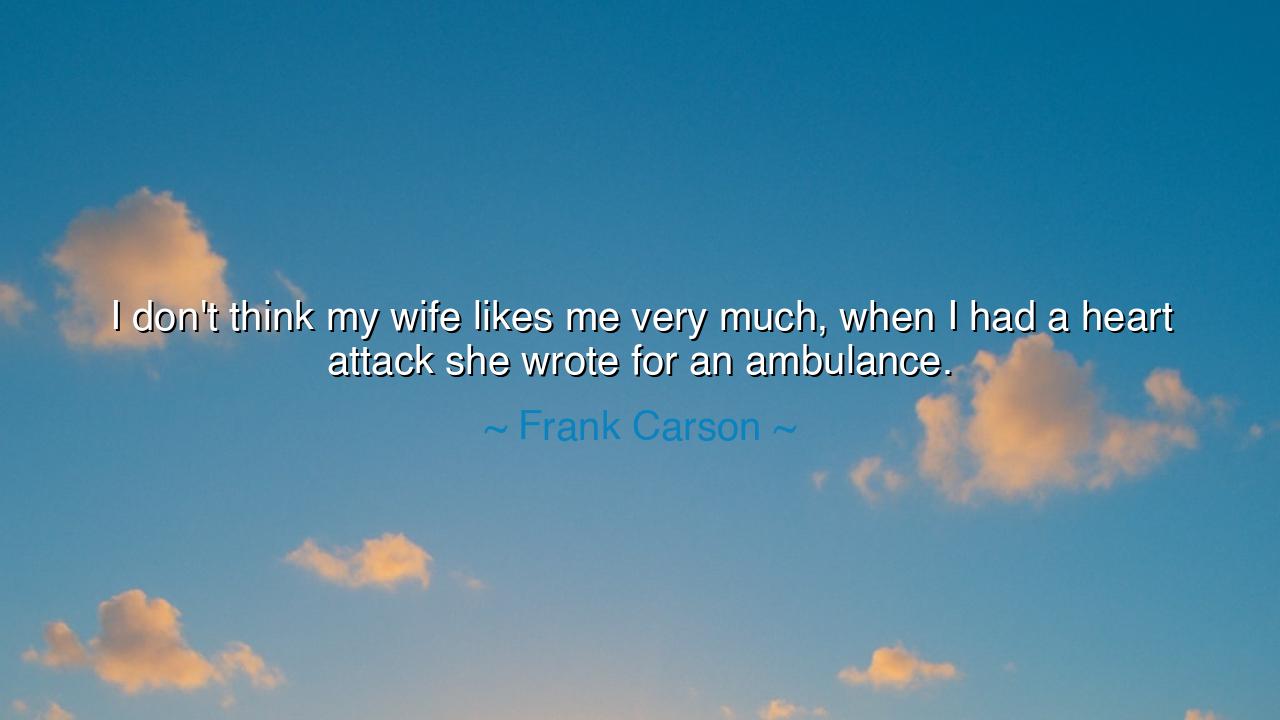
I don't think my wife likes me very much, when I had a heart
I don't think my wife likes me very much, when I had a heart attack she wrote for an ambulance.






The words of Frank Carson—“I don’t think my wife likes me very much; when I had a heart attack she wrote for an ambulance.”—come clothed in humor, yet beneath their laughter lies a reflection of one of humanity’s oldest truths: that within love, laughter is both shield and sword. Carson, famed for his quick wit and boundless cheer, offers here not simply a jest about marriage, but a window into the fragile and funny dance between affection and exasperation that defines all enduring unions. His line, though exaggerated, speaks to the eternal rhythm of relationships—where irritation and devotion coexist, and where love, to survive, must learn to laugh at itself.
The origin of this quote lies in Carson’s long career as a comedian, born in the rich Irish tradition of finding humor in hardship. Known for his playful exaggerations and self-deprecating wit, he often turned domestic life into a stage upon which both man and wife appeared as flawed yet lovable figures. The genius of this line rests in its duality: the absurd image of a wife “writing for an ambulance” rather than calling for help evokes laughter, but also reveals the quiet truth that familiarity often dulls tenderness. In every marriage, time tests passion; affection becomes habit, and love must find new ways to express itself—or to rediscover itself through humor.
At its heart, Carson’s jest exposes the gap between expectation and reality in human relationships. The newlywed dreams of eternal adoration; the veteran of marriage learns to cherish simple endurance. In his playful complaint, Carson captures the universal truth that the romance of youth inevitably gives way to the comedy of daily life. The wife who once swooned may now sigh; the husband who once vowed eternal devotion may now forget to notice. Yet this transformation, though imperfect, is also natural. For true love is not the absence of annoyance—it is the persistence of care even when laughter is all that’s left.
This idea echoes through the ages. Consider the story of Abraham and Sarah from the ancient texts. When told in their old age that they would have a child, Sarah laughed—not in disbelief alone, but in recognition of life’s absurdity. She and Abraham had endured long years together, through famine, fear, and wandering. Their love had matured past passion into partnership, past drama into shared laughter. That laughter, though born of disbelief, became their bond—a divine reminder that joy, not perfection, is the true gift of companionship. So too, Carson’s jest, though clothed in mock complaint, celebrates the same truth: that laughter redeems the imperfections of love.
Marriage, then, is not a sanctuary from imperfection but a workshop of the soul. The wise know that humor is not the enemy of love, but its ally. When passion cools, humor keeps hearts warm; when irritation flares, humor defuses it. A husband who can jest about his wife’s indifference—and a wife who can laugh at his dramatics—have already transcended conflict. They have turned frustration into fellowship. In Carson’s line, the laughter that follows is not cruel; it is tender, for it acknowledges that flawed love is still love, and that even exasperation can be a form of intimacy.
Yet his words also carry a warning wrapped in jest. For while laughter heals, neglect wounds. The image of a wife so detached she “writes for an ambulance” reminds us that love, if untended, withers into indifference. The heart, like a garden, requires constant cultivation—attention, gratitude, renewal. To take one another for granted is to risk losing the music of affection and replacing it with the silence of routine. Humor can save a marriage, but only if it rests upon respect. The wise laugh not to dismiss their partner’s heart, but to forgive their own and another’s humanity.
And so, the lesson of Carson’s jest is simple and timeless: let laughter be your bridge, not your barrier. In marriage, as in all love, there will be moments of weariness, of misunderstanding, of distance. In such moments, humor becomes the thread that mends what time frays. Laugh together—not only at the world, but at yourselves. See in your partner not perfection, but a fellow traveler through the comedy and tragedy of existence. For when two souls can meet in laughter, even in complaint, they have already touched eternity.
Thus, Frank Carson’s humor becomes wisdom: that love is not measured in grand gestures, but in the small mercy of shared amusement. The wife’s indifference, the husband’s exaggeration—these are but lines in the grand play of human affection. And those who can smile at their imperfections, even in the hour of weakness, will find that love—like laughter—does not die; it endures, transforms, and redeems.






AAdministratorAdministrator
Welcome, honored guests. Please leave a comment, we will respond soon